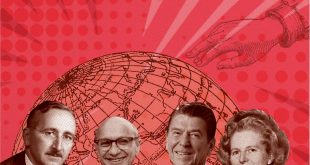.[embedded content] Impotence must eventually bring about what good will ought to have done but did not do: that each state becomes so organized internally that it is not the head of state, whom war really costs nothing (since he wages it at another’s cost, namely that of the people), who has the decisive voice as to whether there is to be war or not, but instead the people, which pays for it. Immanuel Kant
Read More »Kan Magdalena Andersson släppa den nyliberala modellen?
Kan Magdalena Andersson släppa den nyliberala modellen? Trots att ingen längre säger sig vara nyliberal, så dominerar de neoklassiska ekonomiska modeller som nobelpristagaren Milton Friedman skapade nyliberalismen av, den verkställda ekonomiska politiken. Det vill säga att ”marknadens” kollektiva visdom är den bärande bjälken som politiken har att förhålla sig till. Inte ens Socialdemokraterna, med finansministern och den sannolika partiledaren Magdalena...
Read More »Kant’s transcendental green spectacles
Kant’s transcendental green spectacles .[embedded content]
Read More »T’as vu
.[embedded content]
Read More »Was Marx right after all?
Was Marx right after all? .[embedded content]
Read More »Analytical bias
The world is made up of systems. Our body is a system, or in fact a system of systems. What we call “society” is another system of systems, as is the natural environment … But these systems are very complex, difficult to explain or predict. One successful strategy, which has had a revolutionary impact on how we live, is analysis … By biting off chewable portions of a much larger world, science makes it possible to achieve progress in our understanding of how things work...
Read More »Modern macro — ‘genuine plurality’ vs. ‘axiomatic variation’
The DSGE mainstream — which is made up of new classical macroeconomics and neo-Keynesianism — is unanimously based on the core assumptions that characterize the paradigm of social exchange theory. These are rationality, ergodicity and substitutionality, the exclusive acceptance of a formal mathematical-deductive, positivist reductionism. After the ‘empirical turn’ of the last two or three decades, these have been combined with sophisticated micro- and macroeconometrics, or...
Read More »Understanding intersectionality and identity politics
Understanding intersectionality and identity politics .[embedded content]
Read More »Berlin: Die Sinfonie der Großstadt
Berlin: Die Sinfonie der Großstadt .[embedded content] Spectacular! Sixty years later, yours truly at Café Einstein, Berlin. Photo by Bengt Nilsson.
Read More »On sophistry and illusion
On sophistry and illusion
Read More » Lars P. Syll
Lars P. Syll






